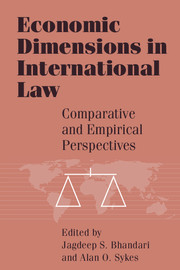Book contents
- Frontmatter
- Contents
- Preface
- Introduction: Economics and international law
- 1 The economics of the most favored nation clause
- 2 The economics of “injury” in antidumping and countervailing duty cases
- 3 The economics of “injury” in antidumping and countervailing duty cases: A reply to Professor Sykes
- 4 Innovations in support of the unitary injury test in U.S. unfair trade cases
- 5 The free trade–fair trade debate: Trade, labor, and the environment
- 6 International conflict and coordination in environmental policies
- 7 Market modernization of law: Economic development through decentralized law
- 8 Toward a positive theory of privatization: Lessons from Soviet-type economies
- 9 New stories on exchange rate policies in transition
- 10 Is deposit insurance inevitable? – lessons from Argentina
- 11 The market for migrants
- 12 The interplay of liquidation and reorganization in the bankruptcy systems of Canada and the United States: The role of screens, gatekeepers, and guillotines
- 13 International political economy approaches to international institutions
- 14 The trade effects of domestic antitrust enforcement
- 15 The Hartford Insurance Company case: Antitrust in the global economy – welfare effects and sovereignty
- 16 Recognition of foreign judgments as a trade law issue: The economics of private international law
- 17 Externalities and extraterritoriality: The law and economics of prescriptive jurisdiction
- Index
1 - The economics of the most favored nation clause
Published online by Cambridge University Press: 05 December 2011
- Frontmatter
- Contents
- Preface
- Introduction: Economics and international law
- 1 The economics of the most favored nation clause
- 2 The economics of “injury” in antidumping and countervailing duty cases
- 3 The economics of “injury” in antidumping and countervailing duty cases: A reply to Professor Sykes
- 4 Innovations in support of the unitary injury test in U.S. unfair trade cases
- 5 The free trade–fair trade debate: Trade, labor, and the environment
- 6 International conflict and coordination in environmental policies
- 7 Market modernization of law: Economic development through decentralized law
- 8 Toward a positive theory of privatization: Lessons from Soviet-type economies
- 9 New stories on exchange rate policies in transition
- 10 Is deposit insurance inevitable? – lessons from Argentina
- 11 The market for migrants
- 12 The interplay of liquidation and reorganization in the bankruptcy systems of Canada and the United States: The role of screens, gatekeepers, and guillotines
- 13 International political economy approaches to international institutions
- 14 The trade effects of domestic antitrust enforcement
- 15 The Hartford Insurance Company case: Antitrust in the global economy – welfare effects and sovereignty
- 16 Recognition of foreign judgments as a trade law issue: The economics of private international law
- 17 Externalities and extraterritoriality: The law and economics of prescriptive jurisdiction
- Index
Summary
Article I of the General Agreement on Tariffs and Trade (GATT), now a part of GATT 1994 in the treaty creating the World Trade Organization (WTO), prohibits discrimination among trading partners with respect to tariffs and other border charges as well as certain domestic taxes. This “most favored nation” (MFN) obligation has been called the “cornerstone” obligation of GATT. It is not without important exceptions, however, including those that permit some discrimination in the protection afforded to declining industries under the “escape clause” of Article XIX and, most importantly, the authority in Article XXIV for the creation of preferential trading arrangements known as “customs unions” or “free trade areas.”
The normative economics of discrimination in international commercial policy has been a subject of study for many decades, and is reasonably well understood at least for competitive markets. But little work has been done on the positive economics of trade discrimination generally, or of the MFN obligation and its exceptions within the WTO/GATT system in particular.
At the outset, it is perhaps useful to set forth the distinction between the positive and normative perspectives. The usual normative analysis of international trade rests on conventional welfare economics. An “optimal” policy will thus strive to maximize the sum of producer and consumer surplus, as well as government tariff revenue if not otherwise distributed to consumers or producers.
- Type
- Chapter
- Information
- Economic Dimensions in International LawComparative and Empirical Perspectives, pp. 43 - 82Publisher: Cambridge University PressPrint publication year: 1998
- 2
- Cited by

